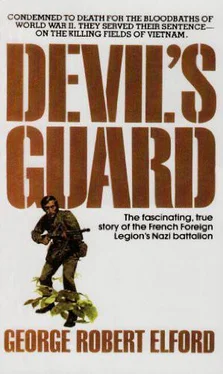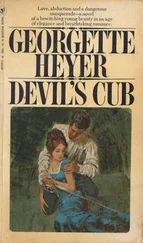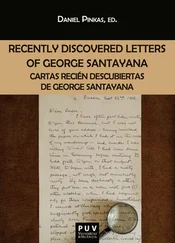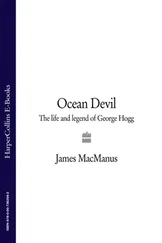“As far as we are concerned, gentlemen, we are fighting against a deadly enemy and not against public opinion. The United Nations is only one of your postwar jokes. A club of senile old men who are trying to play the role of the strict schoolmaster toward nations with a population of ten million souls. To scold anything bigger than that, your United Nations is as impotent as the League of Nations was when it endeavored to censure Mussolini for his aggression against Abyssinia.”
“You have, I believe, already completed your five years of service. You are staying on voluntarily. If you know that the Viet Minh cannot be defeated by conventional means, then why are you still fighting them?”
“Why does man fight locusts?” I asked in return and drew a soft chuckle from the group. “We believe that the more terrorists we manage to kill here* the less our sons and grandsons will have to fight against in World War Three!” No one interrupted me, so I went on. “They say that Nazism was a grave menace to mankind. I see no point in contesting that belief. But would anyone tell me what the Western Allies accomplished in 1945? They liberated a number of captive nations from the Nazi yoke but only at the price of casting a dozen free nations into Soviet slavery. Was it such a wise deal? At least the German-occupied countries could look forward to the day of liberation. What can the people of the Soviet-occupied countries look forward to? Who will liberate them? Only death! In ten years” time the Communists will conquer more land than the Nazis ever controlled—and that with the benevolent assistance of the free democracies. In one respect the Communists are right to assert that the free democracies are governed by capitalists and that a capitalist never looks beyond the very next day. For him only the immediate profit matters, the distant consequence never. The free democracies will trade with the Reds, they will back down when pressed, compromise on every principal issue; they will feed the enemy and supply them with everything they need to conquer the world. This is precisely why the Third World War is inevitable.”
“What should we have done,” a question came from the back row, “kept on fighting in 1945?”
“There was a great chance in 1948 right after the Berlin blockade, monsieur. Berlin should have been evacuated. The so-called Free World had enough money and material to build another Berlin in the west and thus wrench a supreme lever of political and military blackmail from Stalin’s hands. Industries and stockpiles should have been removed, public works and buildings blown up. Then Berlin should have been handed over to the Communists the way it was in May 1945. I agree that sentiments would have suffered but the German people have lost a great deal more than Berlin. Afterwards the Free World should have built its own Iron Curtain: a fortified line along the entire Red frontier with the world, as we know it, ending at the wall. No diplomatic contacts, no mail, no telephone, no trains or planes going through. Communism should have been totally and mercilessly isolated from the rest of mankind.”
“How about the Communists in the Western countries?” I was interrupted. “There are about two million of them in France alone!”
“I would give them a free ticket to the far side of the wall, gentlemen, for, apart from their political aspirations, they are outright military and economic intelligence agents for Moscow. Should the Kremlin request their assistance, the French Communists for instance would never hesitate to map French targets for a Soviet missile attack against France. Besides, it is much too comfortable to be a Communist in a free country, earning good wages, driving a car, having the right to protest, to strike, to change jobs. The Communists should go where their loyalty belongs, the Soviet paradise.”
“But they are citizens. They have their constitutional rights like anyone else.”
“You also have a sentence of death, already signed in the Kremlin,” I replied coolly. “Only the day of the execution has not yet been fixed.”
My conclusion provoked a small revolution in the conference room.
“I agree with him!” someone exclaimed.
“Lunacy!” someone else yelled. “They should be disbanded!”—“They should receive every support.”—“Shame upon France!”—“Shame upon those who are ready to sell France down the drain…”
“You are a… fanatic!” one of the newsmen exclaimed, with a look of astonishment and hostility on his lean face.
“I know that you wanted to say either “Nazi fanatic,” or simply “lunatic,* monsieur,” I remarked with a smile and rose slowly. “Go ahead. We are Nazis if one has to be a Nazi to think in terms of years and not only in terms of days. And if one of us had not become a Nazi under Hitler, he would have turned into a Nazi right here in Indochina. You may also consider us crazy but that was exactly what the British thought of Rudolf Hess when he foretold what would happen if Germany lost the war: Soviet domination of Central Europe, Communist takeovers, rebellions, the dissolution of the British Empire… I can see that some of you are amused. Just wait a dozen more years, gentlemen, and you will no longer be smiling.”
I was perfectly aware that the ideas of a “Nazi extremist” must have sounded quite insane to a group of petty bourgeois newsmen who had probably never smelled gunpowder in their lives. Nevertheless they wanted the truth and that’s what I gave them. We Germans can believe and follow only determined and powerful leaders. It has nothing to do with Nazism. It is our heritage of centuries. We would have followed Julius Caesar, Attila, Napoleon, or Washington with the same devotion we showed Adolf Hitler. But we think nothing of rich boys who gain a plush chair or a marshal’s baton because their parents happen to have plenty of money.
It was evident that the Free World was already looking toward America as the Lord Deliverer and Protector. Surely America is a great country, wealthy and very advanced. But so was the Roman Empire in its own time. Wealth is not a precondition of power and history tells that the richer a nation grows, the weaker it becomes. It was not a wealthier or a more advanced nation that destroyed the Roman Empire. It was the barbarians! Shortly after the interview we were out again for three weeks of hard trekking along a wide and well-maintained trail. Gia Xuey thought it was one of the principal Viet Minh routes to “Nambo”—southern Indochina. We crisscrossed some three hundred square miles of guerrilla territory, which Ho Chi Minh considered conquered and secured forever.
We succeeded in wiping out that illusion. Within the first ten days my men destroyed two major Viet Minh bases, each of which accommodated two or three guerrilla “sections” (about one hundred men-constituted one “section” or company).
Our task was relatively easy, because in the conquered areas the customary guerrilla vigilance appeared to be relaxed. With the nearest French garrison holed up at Luang Prabang, a hundred miles away, the Viet Minh could move and manage its affairs practically unhindered. In the liberated villages the enemy openly displayed the Viet Minh ensign, along with large propaganda posters and banners inscribed with slogans. Small groups of terrorists moved freely within the village and a pair of binoculars always revealed their presence. The loudspeakers, which some propagandists used for mass indoctrination, could be heard from miles away. In their jungle camps, too, the enemy had grown astonishingly careless. Across the wilderness their singing, chattering, and shouting served as “beams” on which our trailblazers could home. Masquerading as guerrillas, Xuey and Noy often infiltrated enemy-held localities and returned with important information. In fact, that little native nurse proved so effective in reconnaissance that I decided to assign her to Gruppe Drei—a great distinction. Noy was as resourceful as she was daring. She would casually stroll into a terrorist camp and hold a sentry’s attention while Sergeant Krebitz and his men closed in on the unsuspecting enemy. With the sentries eliminated it was always easy to penetrate into the camp proper. We did it either at dawn or at dusk, invariably posing as guerrillas ourselves. The ruse always worked.
Читать дальше












